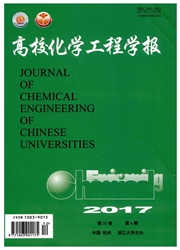

 中文摘要:
中文摘要:
将生物柴油生产副产物甘油加工成高附加值的丙酮缩甘油可以提高生物柴油的经济效益。采用干燥剂原位除水法,在无溶剂体系中,丙酮与甘油通过原位除水、酸催化缩合反应制备丙酮缩甘油,通过单因素实验以及正交实验考察了原料配比、催化剂用量、反应温度、反应时间等因素对甘油丙酮缩合反应的影响。实验表明GT-450阳离子树脂为合适的催化剂;优选实验条件(催化剂用量2g·mol^-1丙酮、反应温度80℃、反应时间1h、丙酮与甘油的摩尔比为1:1.41下,丙酮的转化率达到87.8%。
 英文摘要:
英文摘要:
Glycerolis a by-product of biodiesel production that can be used to synthesis solketal to increase economic profits of biofuel production. The drawback of glycerol acetalisation using acetone is the formation of water, which weakens acid strength of catalysts and reduces reaction rates. An in situ drying agent was employed in this study to enhance glycerol ketal yield and operating conditions were optimized. The result reveals that the GT-450 cationic resin shows the best catalytic performance, and single-factor and orthogonal experiments show that the optimum reaction conditions are: reaction temperature 80℃, reaction time 1 h, acetone/glycerol molar ratio 1:1.4 and catalyst/acetone = 2 g·mol^-1 acetone. Acetone conversion of 87.8% can be achieved under the optimum conditions.
 同期刊论文项目
同期刊论文项目
 同项目期刊论文
同项目期刊论文
 期刊信息
期刊信息
